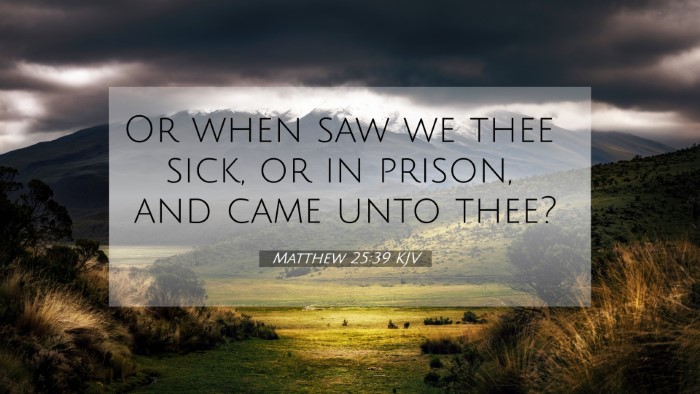Understanding Matthew 25:39
Matthew 25:39 states:
"And when did we see you sick, or in prison, and come unto you?"
This verse is part of a parable Jesus tells about the final judgment, highlighting the importance of compassion and action towards others, particularly the marginalized and suffering.
Overview of the Verse Meaning
In this passage, the questioning illustrates a key aspect of Jesus' teaching about the Last Judgment, where individuals are judged based on their actions towards others. It reflects the theme of the interconnectedness of humanity and the importance of social responsibility.
Insights from Public Domain Commentaries
This verse has been expounded upon by several biblical scholars. Here are combined insights from notable commentaries:
-
Matthew Henry: Highlights that true discipleship is measured by one's love and service to the least among us. This verse emphasizes that unrecognized kindness to others is equivalent to serving Christ Himself.
-
Albert Barnes: Notes the inquiry reveals the surprise of the righteous at their service to Christ, indicating that many acts of love go unnoticed by themselves but are recorded in heaven. The underlying message is that acts of kindness to the needy are paramount.
-
Adam Clarke: Explains that this question underscores the ignorance of the righteous regarding their deeds, portraying a genuine desire to understand how their actions contributed to the kingdom. It reaffirms the notion that service to the unfortunate is honored by God.
Related Bible Verses and Cross References
Understanding Matthew 25:39 is enriched through cross-referencing with other scriptures. Here are key verses that relate:
-
Matthew 25:40: "And the King shall answer and say unto them, Verily I say unto you, Inasmuch as ye have done it unto one of the least of these my brethren, ye have done it unto me."
-
Luke 10:33-34: The parable of the Good Samaritan demonstrates the importance of helping those in need, regardless of their background or social standing.
-
James 1:27: "Pure religion and undefiled before God is this, To visit the fatherless and widows in their affliction, and to keep himself unspotted from the world."
-
Hebrews 13:3: "Remember them that are in bonds, as bound with them; and them which suffer adversity, as being yourselves also in the body."
-
Proverbs 19:17: "He that hath pity upon the poor lendeth unto the Lord; and that which he hath given will he pay him again."
-
1 John 3:18: "My little children, let us not love in word, neither in tongue; but in deed and in truth."
-
Isaiah 58:6-7: Discusses the fasting that God desires: "Is not this the fast that I have chosen? to loose the bands of wickedness, to undo the heavy burdens..."
Thematic Connections
Cross-referencing Matthew 25:39 with other biblical texts reveals thematic connections focused on mercy, service, and the human condition. This thematic analysis can help deepen the understanding of Christian teachings about love and service.
Tools for Bible Cross-Referencing
For those interested in exploring Bible cross-referencing further, several tools can aid in the study:
- Bible Concordance: Useful for locating specific words and their occurrences throughout the Bible.
- Bible Cross-Reference Guide: Guides that outline relationships and references between verses.
- Bible Chain References: Systems that link related verses to facilitate deeper study.
Practical Application
Understanding the implications of Matthew 25:39 can have a transformative effect on personal faith and community involvement. Actions taken in service to others are reflections of one’s faith and commitment to living out the teachings of Christ.
Conclusion
The inquiry in Matthew 25:39 serves as a reminder that our actions towards others matter profoundly in our spiritual lives. Engaging with related scriptures and utilizing cross-referencing tools can enhance our understanding and inspire us to live with compassion and purpose.


